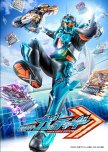
Kamen Rider Gotchard
6 persone hanno trovato utile questa recensione
Questa recensione può contenere spoiler
Mild spoilers ahead:
Everything the show did well:-Decent hero cast overall. Everyone in the hero team feels useful to a degree and can fight untransformed, which helps them stay relevant throughout the show.
-Consistently entertaining villains from start to finish.
-Pretty entertaining monsters and characters of the week for most of the show.
-Pretty great action outside of the constant use of CGI; Gotchard Igniter and Kamen Rider Valvarad in particular come to mind.
-Some interesting concepts in the world-building and story here and there.
-Pretty great soundtrack.
Everything the show did bad:
-This is the Kamen Rider season that has the most spin-offs that are essential to the plot, which makes the story feel incomplete and disjointed. Usually one doesn't need to watch specials and movies to understand a show; at most they introduce a movie character for 1 episode and not properly explain the character to make the viewer want to watch the movie, but they usually aren't that essential. Even when specials are essential for a season, there usually aren't many, and one can watch them after the show is over and still get about the same experience.
However, Gotchard has too many cases where these spin-offs matter. One of the recurring villains of the first quarter suddenly stops appearing; this is because his arc gets resolved in the winter crossover movie with Geats. Said movie introduces the powers of Rinne, who's supposed to be the second most important character in the show, and the show doesn't do a proper job at summarizing the movie in order to understand where her powers come from. The second quarter has the protagonist Houtaro getting a mentor, which leads to him getting an upgrade; however said mentor's character arc gets resolved in this show's summer movie and he barely appears for the rest of the show's run past the second quarter. The third quarter has a whole mini-arc dedicated to Kaguya Quartz a character from the Kamen Rider Legend spin-off, said special and mini-arc have several references to past rider shows and the crossover mini-series Kamen Rider Outsiders.
-Despite Toei's kodomo Tokusatsu not really being known for having good acting, the acting of this show's main duo Houtaro and Rinne is way worse than usual. Houtaro's actor Junsei Motojima at least improves enough after the first quarter outside his occasional weird stare, so he's not really that big of an issue. But Rinne's actress Reiyo Matsumoto while she definitely improves, never improves enough to be considered a good actress, so despite her character having the most consistently well-written character out of the main trio, the fact that she gets her main powers in a movie and the actress consistently having poor delivery for the character's emotional scenes, end up making it hard to care for the character.
-The show fails at giving Houtaro a proper motivation besides empathy to care for the chemies which makes his whole character feel cheap most of the time despite him developing a proper friendship with Hopper1 and most chemies of the week. While episode 18 does give a better explanation of why he wants to befriend all chemies it also opens a bunch of other questions that aren't answered in the show, so it doesn't really fix this issue.
-The show fails at making proper use of its setting. They hardly ever do any proper alchemy and instead it just evolves into being used as normal magic or transmutation. The alchemy academy barely feels like an academy and hardly ever shows them practicing to become better alchemists after the first quarter, this really affects Houtaro's character since he's the newest of the team and is almost never shown doing alchemy or trying to get better at it until Rainbow Gotchard, he should have made the connection with cooking way earlier in the show so that his progression feels more natural, because of this, the final episode feels way less engaging. The school setting feels very disconnected from the main plot, which makes a character like Kajiki, while likeable overall, not really accomplish anything and not hang out with the cast that much during the show's middle. The alchemy sages pretty much don't matter for the show, which makes the alchemist organization barely have any background or any interesting traits, most of the important world-building elements and lore end up coming from the villain Giggist.
-Spanner's arc in the first quarter feels unnecessary and makes so that the character doesn't have proper set up or foreshadowing for his later arcs even if they're competently written.
-After the first quarter, Sabimaru and Renge don't get much to do. Sabimaru at least gets a 2 parter near the end to close his character arc and show how much he's grown, but Renge basically gets nothing, even her backstory episode barely focuses on her.
-Despite Minato's backstory being great, his actions in the show's middle are not justified enough. After Houtaro obtains CrossHopper, he doesn't get much to do despite the show setting him to change the alchemist's order.
-Fuga is a severely underutilized character, which makes it hard to care for him despite his cool moments.
-Clotho loses too many battles to be taken seriously. Out of the 3 sisters she's the one who gets treated the worst.
-Despite Lachesis getting a lot of cool developments throughout the show, it also feels like she barely gets to do something in the second half. She also barely fights despite getting new powers in episode 33.
-Germain and Gaelijah are kind of forgettable.
-Despite Geryon's actions making sense due to the kind of character he is and being a very entertaining villain overall, his main goal is still kind of hard to take seriously. It feels that his backstory should have been explored further since we only get a brief dialogue from Giggist explaining his origins.
-Kaguya and his personal villains are extremely disconnected from the show, which makes his mini-arc feel out place even if it does progress the story.
-While the content of the final arc is good for the most part, it still feels really rushed. The villains in the final arc get the short end of the stick, it feels that Rinne and Spanner didn't get the most use of their new powers and due to the Ouroboros Realm existing it doesn't feel like the finale has much emotional weight.
-Some pretty bad/forgettable monsters/cases of the week in the first quarter of the show.
-Due to the chemmies barely having any character besides Hopper1, not being able to talk besides Nijigon and mostly having to stay in their card form throughout most of the show, they end up being just kind of OK mascots, with the exception of Hopper1 which is pretty good despite not being anything stand-out.
Reasons for the show's strengths:
Main writer Keiichi Hasegawa is really great at writing villains. The other main writer Hiroki Uchida did a pretty good job at following the plot-points Hasegawa set up. Secondary writer Akiko Inoue was good at giving Rinne more characterization and also managed to add some good comedic elements.
Reasons for the show's problems:
Chief producer Yousuke Minato, prior to Gotchard was chosen by Omori to be a co-producer for King-Ohger alongside Mochizuki. Omori wanted to stop working for Kamen Rider since he felt he was out of ideas and thus wanted to produce a Super Sentai show, in order to increase the chances for the show to be greenlit, he wanted to work on the pre-production earlier in secret as a trio of producers, Minato would end up developing the countries of Ishabana and Toufu. Ultimately, the show ended up being greenlit under the condition that Omori would work on the show alone from that point onward. The reason for their removal was that Mochizuki had just been demoted due to his work in Revice and that they wanted Minato to produce the next Kamen Rider show.
Toei wanted to make a more lighthearted season of Kamen Rider since the previous season Geats was darker than usual. Then, when King-Ohger ended up being more popular with adults than children, Toei really wanted to emphasize the lighthearted elements even more in order to "bring tokusatsu back to the children", the next Sentai Boonboomger would also fall under this philosophy. Due to this, Toei wanted Minato to be the next producer in order to train the next generation of producers and because he prefers lighthearted shows.
Due to him being a new producer and the fear that this show would also fall into the pitfalls that Revice did, which was made by a relatively new producer, promoted producers Shin-ichiro Shirakura and Hideaki Tsukuda helped with the show pre-production. Shirakura came up with the idea of having cards as a gimmick, that said cards wouldn't be used for an OCG/TCG and for the show to have a school setting. Minato then came up for the cards to feature monsters inspired by Pokémon and Digimon and that there should be 100 or more cards to collect, since they couldn't use that many cards for individual forms. Tsukuda came up with the idea of using 2 cards for each and forms and decided that the show should have an emphasis on alchemy so that the fusion of cards makes sense.
Usually for most Toei tokusatsu the producer comes up with the setting and checks up throughout the show so that the setting is realized properly by the writer, but in this case he barely came up with any of the ideas of the setting, so it's speculated that this is the main reason why alchemy and the school setting are so half-baked in the show. The only idea that we know he came up with was the creation of Rinne and that she should be the secondary rider, so that's probably why writing wise she's the most consistent one in the cast.
Minato would end up choosing Hiroki Uchida as the main writer due to him having worked with him with Kamen Rider Outsiders. Uchida suffers from the same issue as Nobuhiro Mouri, they're good at following ideas from another writer under proper supervision, which is why they most often work as episode writers. However, they don't work well because they're bad at coming up with their own ideas, so when they do they come up with pretty generic stuff. The original plan for Gotchard by Uchida was for Houtaro to be a student with no direction in his life and ultimately finds the chemies imprisoned, due to their state of being trapped in cards he would free them since he sympathized with them due to both being pathetic, this would ultimately create chaos as the chemies become evil in the presence of people with ill-intentions, due to this event being his fault, Houtaro takes responsibility and decides to catch all the chemies while befriending them. It was planned for there to be no main villains besides the demon from the book, instead the show would have consisted on the cast solving cases of the week up to the final arc with barely any plot progression. Ultimately, Toei higher ups thought that this premise was too bland and decided that Keiichi Hasegawa, who had already been chosen to be an episode writer, should be this show's co-writer alongside Uchida. The reason they chose him was because Minato has mostly been an assistant producer for anime up to this point, so since Hasegawa was a writer who had lots of experience with both anime and tokusatsu, they felt that he would be a good fit for the show.
However this decision was made somewhat late into pre-production, so there was some stuff they weren't able to change. Ultimately, Hasegawa would create this show's villains, who ended up being the best aspect of the show and changed how the chemies got released in order for them to make sense with the new villains. However this change made Houtaro's sympathy for the chemies make way less sense which really affected his character for the worse.
Hasegawa prefers writing darker stories but since Minato wanted this show to be more lighthearted, he would suppress most of Hasegawa's ideas in the first quarter and they would have many creative clashes. Ultimately after his ideas and villains ended up being the most well-received aspects of the show, he would end up writing most of the show's story, world-building, and Spanner's character after the first quarter, while Uchida built up on his ideas and focused on writing Houtaro's character (which is probably why Houtaro was the most sloppily written, he also was the one who decided the show's ending). They didn't know on what direction to take Rinne so the producer got Akiko Inoue to be a secondary writer to give Rinne more characterization. After this, from the second quarter onward, the show improves since now it has a proper direction, but the setup is very flawed due to how directionless the first quarter was.
Due to Kamen Rider's main demographic being really young boys and adult otakus, they didn't believe that Majade would sell well, so they wanted her toys to be premium bandai. However the producer thought that in order for her toys to sell better and for her to be more popular she should get her powers in the movie instead of the show, which negatively affected her character.
In order to maximize sales, Minato wanted the movies to relate to the plot, which is why characters like Licht Kugimiya and Daybreak ended up that way.
Prior to the show release, since Majade was going to be premium bandai, Minato had decided that the retail toys that usually go to the secondary should go to Kamen Rider Legend, a mini-series that focused on crossover aspects, and then introduce said Rider into the show proper in order to bring older fans of the franchise into the show. Since these decisions had already been decided prior to Hasegawa taking over for most of the plot, the mini-arc of Legend ended up happening anyway.
The staff had decided that Majade's and Valvarad's final power-ups should happen at the very end so that they feel like they're "the strongest" forms, since they happen too late to lose to a villain. The final power-up Gotchard gets in the final episode was decided at the last minute by Bandai since the transformation item had already opened for pre-orders due to the summer movie.
Some people speculate that the reason for Houtaro's and Rinne's actors being worse than usual is due to Minato having worked mostly on anime, so when doing casting he chose more arbitrarily. Usually casting is done with the main writer and the pilot director, but people speculate due to the phrasing in some interviews that they were both cast when Uchida was the sole writer for the show and he just didn't mind it due to him mostly being an episode writer. Then the villains, and most main characters introduced later had way better actors since they were cast after Hasegawa had joined the project. But these are purely theories since we don't know how early the main duo were cast.
Some leaks indicate that Shirakura was more involved in the show than it initially seemed, but it's unknown what contributions he had aside from the pre-production.
Overall:
The show ranges from average to kinda good. It definitely doesn't do anything too offensive to be considered bad but also doesn't do anything too good to be considered great. Also due to its muddled plot direction, the show comes off bland at times. The show has a lot of cool ideas, but they're not executed that well because of the previously stated problems. The show does improve a lot after the first quarter, but it still feels incomplete overall, has a pretty rushed final arc and has a mixed bag of a finale. Overall, I can only recommend this show if you're really into Kamen Rider or if you're really into the villains of this show after watching the first 3 episodes since they're by far the most consistent aspect of the show. While this show isn't bad or even mediocre, there's just far better Tokusatsu out there, and this show doesn't particularly excel at anything.
Questa recensione ti è stata utile?
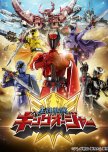
Osama Sentai King Oger
2 persone hanno trovato utile questa recensione
-Every character from the heroes, to the villains, to the side-characters and even characters of the week are really well written and useful throughout the entire show.
-Great acting from the cast and arguably the best acting in the franchise so far. Barely any character of the show feels like they're bad at acting, at worst they're decent. The only noticeable one is a character introduced in the second half, Prince and even then he's not bad by tokusatsu standards, just worse than the rest of the main cast so the gap in acting feels noticeable but it really isn't a deal breaker.
-Amazing serialized story from start to finish, barely any episode feels like filler.
-It being the most serialized Sentai show so far, even managing to be more serialized than Dairanger, Gekiranger and Kyoryuger makes the show feel distinct from the other seasons from the franchise.
-Fantastic soundtrack.
-Tons of subtle foreshadowing makes the show really rewatchable.
-Fantastic world-building, ambitious fantasy setting where every country feels unique.
-Both the hero team and the main villains are filled with charisma.
-The show never has a considerable drop on writing quality.
-Ambitious high-stakes finale.
-Jeramie is arguably the franchise best extra ranger, due to how well his dynamics are with the rest fo the cast, it never feels like it fractured their dynamic or that he takes too much screen-time
-The mech fights are consistently amazing and among the franchise's best.
-The monsters of the week in the first half are really great consistently.
Everything the show did bad:
-The show's fights have a severe overuse of slow-motion, resulting in the opposite effect and removing most of the weight of the fights while also making the good choreography hard to appreciate.
-Despite the mecha battles being amazing, the they barely use them in the second half.
-While the crossover mini-arc with Kyoryuger is really great, Kyoryuger's lore actually intertwines with this show's plot and it has heavy spoilers for that show so it means that a portion of the show would be hard to appreciate if you haven't seen Kyoryuger prior.
-While the CGI backgrounds are mostly good, especially for tokusatsu standards it still can be really distracting at times, specially during some fights.
-While Rita is a really likeable character overall she gets considerably shafted compared to the rest of the rangers and her backstory isn't properly explained.
-While the main antagonist is extremely charismatic, most of his decisions being mostly dependant on what's fun for him isn't really a thing for everyone and might come off as cheap writing for some.
-The people of Shugodom can come off as too trusting and kinda dumb at times.
Reasons for the show strenghts:
This show was a massive passion project by producer Omori and main writer Minato Takano. He was out of ideas for Rider shows and really wanted to go back to doing Sentai, so in order to secure his position as the next producer in spite of producer Shirakura 5-year plan for Sentai, he started pre-production in secret alongside producers Mochizuki and Yousuke Minato. Having the manpower of 3 producers with barely any restrictions and more time than your usual mainline Toei tokusatsu production made it so that the show could have more high-quality CGI and a better thought out setting. While Toei's condition for greenliting the project was the removal of producers Mochizuki and Minato, their set-up was already done and main writer Takano knew how to develop their ideas + Omori who was the main creative source remained.
The staff opted for actor hiring strategy that the franchise has had since Kiramager of hiring more slightly more experienced actors than usual.
The show's main director Kazuya Kamihoriuchi is among Toei's best and made the emotional scenes and the Mecha fights really stand out + also he helped with a lot of the creative output after the show's timeskip.
The show made use of Toei's new led room which also led it into it being greenlit. This made it so that could properly create their ambitious fantasy setting.
Main writer is really good at character writing and really cares about lore.
Reasons for the show flaws:
Producer Kazuya Kamihoriuchi tried too hard with the action resulting in a severe use of slowmo and cycling back to being kinda bad.
Despite the CGI being better than most Toei tokusatsu shows due to having more time, it still isn't that much more time, so the CGI is still very flawed.
Overall:
Easily one of the best Sentai shows, it just barely has any big flaws besides being better enjoyed if you've watched Kyoryuger prior. Arguably has the best characters, acting and world-building in the franchise. High recommend, specially if you're into the storytelling style of Shounen anime/manga. I could only see someone not liking the show if they find the CGI too distracting to enjoy the plot or if the characters don't really jive with you in the first few episodes of the show.
Questa recensione ti è stata utile?
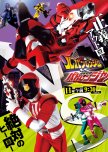
Kaitou Sentai Lupinranger VS Keisatsu Sentai Patoranger
2 persone hanno trovato utile questa recensione
Questa recensione può contenere spoiler
Mild spoilers ahead.
Everything the show did well:-The 6 Main Rangers are all very likeable characters.
-Battle choreography is consistently amazing.
-Very good cast of actors, the 7 rangers have ton of charisma.
-Pretty great soundtrack.
-The conflict between the Lupinrangers and Zamigo help their stakes feel real and make them more endearing.
-Some episodes can be pretty funny.
-The dynamic of having a kinda morally ambiguous team alongside a good-two shoes team is interesting.
-The show has lots of style that makes it stands out aestheticly from other Tokusatsu.
Everything the show did bad:
-While the overall cast is likeable, the show has favoritism towards the Lupinrangers. The Patrangers get shafted most of the show and barely get any upgrades. It ultimately ends up mostly wasting the dual team dynamic.
-The rivalry between the 2 teams feels very forced since it mostly stems from the Patrangers killing every monster they encounter rather than arresting them or even interrogate them which they only did twice in the show. This is especially grating if you've seen the other 2 cop Super Sentai where they actually arrest their monsters and only kill them if they've been properly judged. This overall makes the story feel very draggy.
-While the 7th ranger Lupin X has ton of charisma and it's pretty likeable initially, he fractures the already flawed team dynamic even further.
-Lupin X whole character arc and the truth behind Lupin comes off as kinda uninteresting since it feels very detached from the goal of the other rangers and the villains, plus it really never felt like something the other rangers would be opposed to him after the reveal. All of this ultimately makes him a pretty unlikeable character by the end.
-The villains are pretty boring for the most part because their actions feel very detached from their goal of world conquer as most monsters just do whacky low-scales crimes which makes the fact that the Patrangers don't arrest them feel even weirder. Again, this feels more unacceptable if you've seen other Sentai shows since a lot of them manage to make goofy monsters while also making them feel like a world-level threat. At least the writer got it right with her later show Zenkaiger.
-The villain generals barely get any backstory or even a chance to do something interesting after the first quarter.
-The main antagonist Dogranio despite having an entertaining personality, feels boring overall because he barely does anything on the show and we're only given his backstory at the very end and only via dialogue.
-While Kogure manages to do some interesting stuff with his disguises, him and the rest of the sidecast from both teams are mostly not relevant nor interesting.
-Despite LupinBlue being a likeable character overall, he isn't as likeable as the other five because the writer kind off sucks at writing a straight man character, but granted this is mostly a nitpick.
Reasons for the show's strengths:
Producer Utsunomiya wanted to make an even more different team dynamic than the one from Kyuranger. Action Director Hirofumi Fukuzawa wanted to make the show even more stylish than the previous cop Sentai Dekaranger, so he went more all out than usual. Main writer Junko Komura is really good at choosing lead actors for her script. The pilot made by Sugihara had a very cinematic feel, so the following directors had to keep the momentum of the first 2 episodes to make the show feel consistent.
Reasons for the show's flaws:
Main producer Utsunomiya was afraid that 2 teams would be alienating, so requested that the villains were closer to standard Sentai. There's nothing particularly wrong with this approach but main writer Komura did a really generic execution of this idea, which ultimately resulted in the monster of the week format being worse than usual. Also she has the issue of focusing on only a few characters which doesn't make that good of a fit for Sentai since it's a team-based series. On top of all that she probably focused more on the Lupinrangers because in an interview she said she was scared that the Patrangers would feel too similar to the other 2 previews Cop Sentai shows. Other possible reason for the show focusing more on the Lupinrangers was that according to Utsunomiya the reason why he chose Junko Komura again so soon was because prior the animal theme for Zyuohger he considered doing thieves (That's how he phrased in the interview but I assume more that he means that there was going to be a thief plot point in Zyohger since other interviews indicate that Komura was chosen after the animal theme which is usually the standard for writers in Toei Tokusatsu), so he wanted her to use some of the ideas she couldn't do. So maybe she had a lot of plans for the Lupinrangers due to this but not as much for the Patrangers.
Ultimately this show would result in Utsunomiya being demoted due to releasing two consecutive financial failures, while the show's quality was definitely a factor, most of the fault is on the toy designers making pretty bad toys rather than the show's staff which makes this feel kinda unfair.
Overall:
For everything this show did right, it felt like it did something wrong. The overall storyline comes off as boring past the first arc, and the cast focus is kind of muffled. However, the actual direction of the show is great and the main 6 cast members are really likeable which keeps the episodes from being straight up bad in spite of being dragged down by the villains. Overall, the show felt average to me, but if you like the characters enough I could see it being a good time for other people, just don't go in expecting the Patrangers to get the same level of treatment as the Lupinrangers nor a particularly deep plot.
Questa recensione ti è stata utile?
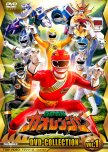
Hyakujuu Sentai Gaoranger
1 persone hanno trovato utile questa recensione
-Great hero cast that gets progressively more smug the more the show goes on.
-The main villain duo is extremely likeable and have really fun hijinks.
-The villain generals are all entertaining.
-Really great final battle.
-Great battle choreography on the ground fights.
-Lots of mecha variety keeps the giant battles consistently fresh.
-Amazing soundtrack.
-Really funny show overall.
-Manages to have a pretty natural progression of stakes.
-Cool world-building here and there.
Everything the show did bad:
-GaoYellow becomes more of a joke character once GaoSilver joins the team.
-GaoBlue gets less focus episodes than everyone else which considerably hurts his character in spite of being likeable overall.
-GaoBlack is often weirdly cut out from fights when he's not the focus of an episode.
-First Super Sentai show to go hard on CGI, so it's used more often than usual.
-Pretty safe show overall.
Reasons for the show's strengths:
Main producer Jun Hikasa wanted the show to have more mechas than ever due to this being the franchise's anniversary and because he wanted to have multiple cheaper mechas instead of having few more expensive than normal mechas like the previous season Timeranger in order to make up for the poor toy sales.
Main writer Junki Takegami is really good at making the characters fun.
Reasons for the show's problems:
Main writer Junki Takegami likes to take the plot in a safe direction.
Main producer Jun Hikasa wanted to experiment with CGI due to this show being a big project as it was the franchise anniversary.
Otherwise I couldn't find much about the show's production outside prototype designs of rangers and mechas that were never used.
Overall:
While it isn't the most unique Sentai, it's still a really great show overall with really good hijinks between the 6 rangers, Tetomu, Yabaiba and TsueTsue. Highly recommend if you're a Super Sentai fan or are into Saturday Morning cartoons from the same era.
Questa recensione ti è stata utile?
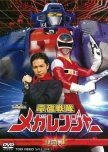
Denji Sentai Megaranger
1 persone hanno trovato utile questa recensione
-Really likeable cast overall in both the heroes and villains.
-The twist with the main villains is pretty good.
-The high-school setting is done differently from the previous 2 attempts, this and the nasacore elements that the show has makes it stand out form other Sentai.
-Most monsters of the week are entertaining.
-Consistently good action, especially on the mecha. The team also has a pretty unique powerset for the on ground fights.
Everything the show did bad:
-Not the most unique plot.
-After the extra ranger MegaSilver is able to overcome his time-limit issue there's barely any reason for him to not appear to help the rangers, luckily this happens so late that it only feels off for a few episodes.
Reasons for the show's strengths:
With the rise of the internet and digital devices in 1995, main producer Shigenori Takatera wanted to push this theme as the center piece of the show in order to teach kids about these technogical advancements. However this theme was a bit too abstract and the staff struggled a bit during the pre-production.
Due to Super Sentai now being adapted into Power Rangers, Takatera decided to add space elements into the show which helped with the mecha production, although they had to make the first mecha a 3-piece combiner in order to release a cheaper toy due to problems with the economy.
TV Asahi producer Taro Iwamoto came up with the show having a high-school setting in order to increase viewership. This help the show to have a concrete setting. Main producer Shigenori Takatera decided to make this the main focus of the show in order deferentiate from the previous high-school Sentai Turboranger, who were heroic highschoolers but said show didn't emphasize the highschool as the main setting.
Due to insistance of assistant producer Naomi Takebe and side writer Yasuko Kobayashi, the show emphasized on giving proper focus and character arcs on all members of the team, and decided on the team having a different dynamic where the black ranger Kouichirou is the leader and yellow ranger Chisato serves as the second in command in spite of the red ranger Kenta being the main protagonist.
Reasons for the show's problems:
While main writer Junki Takegami is really great at writing characters, he tends to take a safe direction for the plot of his stories.
At the time the Super Sentai franchise had this quota where the extra ranger couldn't have that much screen time in order to not disrupt the team dynamic of the main team. While this show handled it in a more organic way than Dairanger and Ohranger, it still wasn't optimal.
Overall:
While a safe show overall, it's still a really great show and would highly recommend to any Super Sentai fan or if you're into highschool settings in dramas.
Questa recensione ti è stata utile?
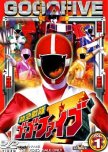
Kyuukyuu Sentai GoGoFive
1 persone hanno trovato utile questa recensione
-Everyone in the hero side, from the rangers to the side characters are really likeable.
-One of the best team dynamics in the franchise, the show manages to make the most use of the team members being family members and stand out from the other 2 family Sentai shows.
-The rescue gimmick makes the monsters/cases of the week be constantly entertaining and heavily stand-out from other Sentai seasons. The show has enough budget to make proper use of this gimmick throughout the whole show for the most part.
-Really cool action from beginning to end, regardless if it's outside or inside the mechas.
-Better acting than usual Sentai shows make the emotional scenes in the show really hit.
Everything the show did bad:
-The show isn't the most unique due to following a lot of Sentai tropes and the villains while overall enjoyable not really stand out.
-The main antagonist is really generic and boring overall.
-Some elements of the plot points with team's mother feel contrived.
Reasons for the show's strengths:
Due to Japan enacting the Emergency Life-Saving Technician Law in 1991, the Great Hanshin earthquake in 1995 and the year this show was going to be airing, 1999, as 9 is pronounced the same as rescue, the core motif of this show being rescue was decided really early on and this show had more planning than usual. This allowed the show to have way more budget for its first 2 episodes and for them to try way more different approaches to action and setting throughout the show.
Main director Hajime Konaka wanted the team to show their face more often in order to make the rescue scenes more organic which is why the team has close up shot where you can see their faces through their helmets.
Main producer Jun Hikasa wanted the team to be family members taking inspiration from a show he previously worked on Yugen Jikko Sisters Shushutorian and another Toei produced show that was popular at the time Hitotsu Yane no Shita.
Reasons for the show's problems:
While main writer Junki Takegami is really great at character writing he tends to go pretty safe on the plot structure of his shows.
Overall:
While I feel that a lot of people would give this show an 8 due to not being that unique in its story department and being pretty safe overall. However the show's style, characters and dynamics are done so well and the rescue gimmick make the show stand out from other Sentai and easily makes it one of the best safe Sentai. Recommend this show to any Super Sentai fan or if you're into rescue/firefighting dramas or other rescue tokusatsu.
Questa recensione ti è stata utile?
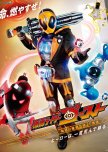
Questa recensione può contenere spoiler
Mild spoilers ahead:
Everything the show did well:-Alain is an amazing character. Other than him the majority of the hero cast or redeemed villains in this show range from fine to likeable overall.
-Some cool world-building concepts here and there.
-Adonis is and his motivations make sense.
-The monster of the week in the first half are pretty entertaining.
-Fantastic soundtrack.
-Cool action for the most part.
-The show does the human drama/slice of life scenes really well.
Everything the show did bad:
-The villains Chikara and Adonis get removed from the show in the dumbest way possible.
-The main antagonist Adel is among the worst antagonists that this franchise ever had.
-The other 2 dudes form the temple, Narita and Shibuya could be removed from the show and it would hardly affect the plot.
-Most of the cool world-building elements that help explain what's going on in the Ganma world happen in movies, novels and specials, not in the actual show which makes it near impossible to care for the show's main conflict.
-After the first quarter the show's writing quality takes a nosedive outside the Alain focused episodes and the eyecon collecting episodes, the latter of which are very few since they collect most in the first quarter. Basically the show introduces the Deep Connect organization which ends up making the story unnecessarily conveluted and then the show's quality drops even harder when the show starts focusing on Adel.
-After the first quarter Makoto's character feels aimless. For a while his character goes nowhere and when they finally put focus on him his backstory and development become unnecessarily conveluted.
-Ghost's main form, Ore Damashii has a pretty boring fighting style initially and it's only later that it improves as it starts having a monk-like fighting style.
-Most of the stuff with the Great Eye is poorly explained, since again, it's explained properly in content outside the show.
Reasons for the show's strengths:
Main producer Kazuhiro Takahashi wanted to return to the bizarre editing and direction of the Showa seasons so he came up with the unconventional and unheroic motif of ghosts. He wanted to portray the importance of life which led to the creation of characters Adonis and Grandma Fumi.
Main writer Takuro Fukuda excels at writing slice of life and human aspects to his stories, so the Alain episodes and his slice of life scenes are really greatly done.
Reasons for the show's problems:
Main writer Takuro Fukuda had scheduling issues which led to him being absent during the show's pre-production which resulted in some poor planning when it came to the show's setting and him being absent during the show's middle with the exclusion of the Alain focused episodes. Due to not being able to write the episodes in time he dedicated himself to write the movies and specials of the show since he wouldn't have such restrictions which is why the spin-offs of this show have so many important plot-points when in comes to the setting and better character writing for the most part.
Due to the response of parents and kids who watched Kamen Rider Ghost's cameo in Kamen Rider Drive's summer movie being that he was 'too scary', main producer Kazuhiro Takahashi decided to reshoot the first 2 episodes of the show in order to edit some of the scary scenes and ended up changing the show's directing style for the rest of the show. This resulted in the show not being able to adopt the Showa/creepy directing style the staff wanted for the show and for the directors to not know what of fighting style to give to Ghost's main form 'Ore Damashii' for a while since he wasn't able to use the spectral fighting style they had planned for him. This reshoot of episodes also resulted in the show having more budged constraints and scheduling issues, these combined with Fukuda's affected the show's pacing. Takahashi also ended up changing the show's setting 3 times during the show's run, which led to the writing feeling more conveluted and caused most of the problems with the show's writing as spite of the Fukuda being absent the show still had competent side writer Keiichi Hasegawa but with Takahashi making so many changes midway to the show and the time constraints with the scripts, there just wasn't much him and even Fukuda could do once he returned for the final arc.
Overall:
Despite the majority of the characters being likeable, this show has so many things dragging it down that the show ends up being bad overall. I can only see people enjoying this show if they consume all of the outside the show's content, but even then that only elevates it to a 6 since those specials don't fix Adel who's a prominent aspect of the show. I can only recommend this show if you're a Kamen Rider completionist or if the setting and motif seem cool enough to you to watch its movies and specials alongside it even knowing that the main antagonist in this show is disappointing.
Questa recensione ti è stata utile?
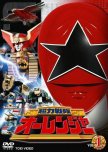
Chouriki Sentai Ohranger
1 persone hanno trovato utile questa recensione
-Good ranger team and commander overall.
-The pink ranger Momo is extremely likeable and almost all of her focus episodes are really great despite mostly consisting on filler.
-Really great villains overall, especially towards the final arc.
-Really great final arc.
-The villains feel like a force to be reckoned with due to them having already conquered most of the planet prior to the show's start, helps ups the stakes in a unique way compared to other seasons.
-The dynamic of the team being a military corp is done differently enough from other military seasons to stand out.
-Really good action both in mecha and outside.
-Most monsters of the week are entertaining.
Everything the show did bad:
-The transition of the show being one of the darkest Sentai ever made to becoming really goofy isn't smooth and hurts the characters of the main team with the exception of pink. They still manage to be pretty likable overall but the show's tone ends up feeling all over the place due to this change.
-The extra ranger Riki and Dorin aren't that entertaining due to being absent for good chunks of the show and their personalities not being that interesting. That said Riki feels consistently strong throughout the show and at least one can kinda buy his absence from the episodes due him working for Dorin first and being a hero second.
-The side characters that the show introduces later, the wacky scientist Kotaro and the Shida family aren't really that likeable nor that funny.
-The civilization of Pangaea feels underexplored.
Reasons for the show's strengths:
This was the first Super Sentai season to acknowledge Goranger and JAKQ as part of the franchise. Due to this this season was treated as the 20th anniversary of Sentai and the producer Takeyuki Suzuki wanted the team to be soldiers like Goranger. This season just like the previous one Kakuranger brought back Susumu Yoshikawa to co-produce to realize the ambitions they sought out to do.
Some people speculate that the pink ranger Momo was always supposed to have filler episodes prior the show's change of tone, so she was the character least affected by the change. But this is just a rumor.
Reasons for the show's problems:
The staff wanted to realize a hard dark setting to differentiate from previous seasons. But due to the Hanshin Earthquake that occurred prior the show's airing and even more due to the Tokyo subway sarin gas attack that occurred after the airing of the third episode, from episode 9 onward the show adopted a more comedic approach to its tone in order to cheer up the audience.
The high contrast of the show having one of the darkest starts to any Sentai season, the darkest beginning at the time it was airing to becoming whacky and comedic from episode 9 up to the start of the final arc feels really jarring. The new side characters introduced in the middle to light up the tone ultimately weren't that funny due to not being planned. However in spite of these changes the main characters and villains managed to stay likeable from beginning to end.
Overall:
The show's tone is all over the place and there's a few characters introduced later that drag this show down. But overall the show manages to still be great overall with a likeable team of Rangers and villains plus a really cool setting. I recommend this show if you're a Super Sentai fan.
Questa recensione ti è stata utile?
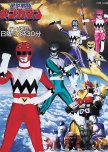
Seijuu Sentai Gingaman
1 persone hanno trovato utile questa recensione
-Fine team and villains overall.
-Cool backdrop setting.
-Some monsters of the week are enjoyable.
-Really cool action both outside and inside the mechs.
-Pretty likeable side cast.
-Biznella is a pretty fun villain.
Everything the show did bad:
-Really generic show overall, besides the action and a handful of episodes the show really doesn't do anything that particularly interesting and mostly take a REALLY safe approach.
-The team, while it doesn't have anything particularly bad about them, they just barely have anything interesting going for them. The pink ranger Saya and the second Black Knight in particular are pretty mediocre. This is due to Saya having less focus episodes than the rest of the team and the second Black Knight's personality overlapping a lot with the red ranger Ryouma, not only that but he leaves the team up until the final arc in order to train, but his training pretty much barely mattered in the end which made his absence in the team feel pretty unnecessary.
-The main villains don't have much interesting in them, especially the main villain Zahab and one of the villain generals Battobas. Despite the attempts to give Bucrates and Iliess character they still manage to be uninteresting due to inherently being connected to the Nothing-character main antagonist. Only Biznella manages to be interesting and he goes out in a pretty disappointing way.
-The quest-like plot progression that show adopts makes the story feel really draggy at times and makes so that the show cannot make proper use of its villains.
Reasons for the show's strengths:
The staff was inspired by Kamen no Ninja Akakage and decided to make every general have their own army.
Main writer Yasuko Kobayashi was allowed to have more freedom in the final quarter which allowed the show to improve which allowed to the show to have better villains like Biznella and also allowed for the standout great episode 40.
The staff went to great lengths to have horse scenes in the show.
Producer Shigenori Takatera is good at coming up with interesting settings.
Reasons for the show's problems:
Main producer Shigenori Takatera wanted this season to be a more traditional return to form due to the every season since Jetman being outside of the norm (I honestly don't know how he thinks that considering that Megaranger, which he produced, is a fairly normal Sentai outside the High-School setting, and this was the 3rd Sentai to have said setting). This lead to him restricting most of the creative freedom of the show's main writer Yasuko Kobayashi. This lead to the show feeling really generic from start to finish and never really committing to any of its original concepts.
Overall:
The show takes things way too safe for my liking, it doesn't feel like one is missing much for not watching this show and if you've seen other Sentai you can predict most of what's to happen. e for my liking, if you have seen just about any tokusatsu show prior this one you can easily predict most of the story. I cannot really recommend this show when there are far better 'safe' Sentai shows out there like Dynaman, Gaoranger and specially Kiramager, these shows manage to be safe by following the usual sentai formula and common tropes while still doing interesting enough things to make them stand out from the rest, Gingaman on the other hand just doesn't have much going besides its action and a few side characters. It doesn't do anything offensive enough to be considered bad or even mediocre, but it's a painfully average show overall and I can only recommend it if you are a Super Sentai completionist or if you want to watch crossovers where Gingaman is prominent, its tribute in Gokaiger in particular is really great and won't make that much sense unless you've seen Gingaman prior.
Questa recensione ti è stata utile?
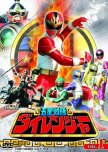
Gosei Sentai Dairanger
1 persone hanno trovato utile questa recensione
-The core 5 members of the team are really likeable overall, especially the green ranger Daigo.
-Excellent battle choreography on the ground fights.
-Besides the cool martial arts, the team has really unique abilities for the most part.
-Mostly serialized plot structure that makes it stand out from other Super Sentai seasons.
-The main villains trio of the Gorma Tribe are heavily involved in the plot and fights.
-With the exception of the yellow ranger Kazu, all the team members have a constant rival throughout the show.
-Cool world-building for the most part.
-Good balance between lighthearted and dark tones for the most part.
-Consistently really cool monsters of the week.
Everything the show did bad:
-The yellow ranger Kazu gets considerably shafted for the most part, as he has less fights than the other 4 main members of the team, it's the only ranger that doesn't have a rival and has a whole arc that while entertaining mostly consist on him not transforming. However he still manages to be a likeable character overall in spite of this.
-The first 2 episodes of the show really suck compared to the rest of the show.
-One of, personally the worst finale in the franchise. As it cheapens most of the world-building that the show had done up to that point and pretty much ruins Kujaku's character arc. I could see some people enjoy the ending due to its philosophical implications but it just comes off as needlessly depressing and kinda dumb from the main villains' standpoint.
-The extra hero KibaRanger dissapears from the show from time to time arbitrarily without any explanation, which makes him feel like a glorified mech. While he's a likeable character overall, he's the least enjoyable since his lack of screentime hinders his development and some of the emotional weight of his scenes.
-Most mecha battles with Gosei Gattai Dairen'Oh, which is the most used mech in the show, suck due to being really short and usually just consisting of a slash and not much of a battle.
-Zydos is heavily shafted compared to the other villains/rivals in the show despite being part of the main villain trio, he's also the only one from the trio to not have a rival.
-Gorma the XV is just an OK villain.
-Daijinryuu's mini-arc feels shoe-horned in and disconnect led from the main conflict.
-While this is mostly a personal issue, I felt that the main trio of the Gorma Tribe didn't have enough charisma which was a detriment for my enjoyment of the show.
Reasons for the show's strengths:
Main producer Takeyuki Suzuki wanted the show to stand-out from previous seasons since it was the franchise 15th anniversary (at the time the first 2 seasons weren't consideres Super Sentai), taking inspiration from fighting games that were popular and because chinese culture was spreading in Japan at the time in particular Oolong tea becoming popular resulted in the show having a martial arts theme as a focus. The staff put a lot of effort on making the action great and stand-out, they also made the actors fight out of suit more often than the past few seasons. Due to the fighting game inspiration the staff wanted the team to not have a ranger leader and for every ranger to stand-out from each other resulting in every ranger getting an arc and rival dedicated to them (with the exception of Kazu who got an arc but not a rival). Main writer Noboru Sugimura wanted to surpass Jetman in uniqueness which lead to the show taking a more serialized approach.
Reasons for the show's problems:
The yellow ranger's fighting style, "the drunken fist" was too difficult to perform consistently and film which resulted in him getting shafted compared to the rest of the cast and having his arc dedicated to him obtaining a mecha so that he didn't have a proper rival to fight and they wouldn't have to film his fights as much.
Due to the whole 'surpassing Jetman' ideology the writer came up with an even more controversial ending which backfired.
Kibaranger was the second extra ranger (third, if you count Liveman) to be made. The previous one, DragonRanger was supposed to be an one-off idea inspired by Mad Gallant from Juspion and Silva from Bioman. However due to his intense popularity it was decided to try it again this season. At the time Toei wanted the extra ranger to not properly join the team as to not overshadow the core members, the DragonRanger from Zyuranger was made with this intent but KibaRanger wasn't. This resulted in the character being weirdly written out from episodes despite not making much sense unlike the DragonRanger who had a proper lore reason to not appear consistently.
Overall:
I feel that most people would give this show a 7/10 since my issues with the villains are mostly a 'me' issue rather than the show's fault. And I could see people give this show an 8 due to how cool the action is in this show. The show's biggest issue is the ending as it's really bad and honestly kind of ruined the show for me, but I feel that most people would be able to look past that and still find the show great in spite of it, and admittedly the ending is really different from anything any Sentai season has done before or since so I could even see people giving this show a 9 for its uniqueness.
Overall I would recommend this show to any Super Sentai fan or martial arts fan. Just be sure to give the show at least a 4 episode chance before deciding to go through with it since the first 2 episodes are notoriously bad and not at all representative of the quality of rest of the show and be prepared for a divisive ending.
Questa recensione ti è stata utile?
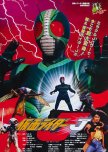
-Pretty good plot and protagonist.
-Really cool action and sets.
-Really good cast of actors.
Everything the movie did bad:
-Lots of pacing issues, it feels like this movie's plot would bave worked far better as a show rather than a movie.
-Not the most unique plot.
Reasons for the movie's strengths:
The cast was selected very carefully. The special effects director Nobuo Yajima had experience in Super Sentai and Ultraman allowing to do the giant scenes in J properly.
Reasons for the movie's problems:
The movie's production was temporally halted because it the staff weren't allowed to release a movie in January like they originally intended and was only allowed to resume production when they secured being able to do released in April of next year. This resulted in the movie being filmed in just 20 days.
Creator Shotaro Ishinomori and director Keita Amemiya didn't want to have a Giant rider, and the idea was implemented alongside the movie's name in the very last draft of the script.
Overall:
Pretty good film overall but not particularly great, the pacing drags it down significantly and feels like the movie isn't able to make the most use of its concepts. It's not a must-see movie by any means but if you're really into Kamen Rider I would recommend it still since it doesn't do anything offensively bad and it's still a good time overall.
Questa recensione ti è stata utile?
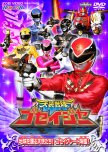
Tensou Sentai Goseiger
1 persone hanno trovato utile questa recensione
Questa recensione può contenere spoiler
Mild spoilers ahead:
Everything the show did well:-Overall likeable cast of characters from both the rangers and side characters by the end of the show.
-One of the most interesting final main antagonist in the franchise.
-The show switching evil factions with each arc helps the setting feel more variate and it's a good change of pace from other seasons.
-Great finale.
-With the exception of the Warstar villains from the first arc, the villains in this show are pretty enjoyable.
-Pretty enjoyable mecha fights overall.
Everything the show did bad:
-Some of the worst battle choreography in the franchise. The rangers don't have anything interesting going on in terms of fighting styles, their unique powers devolve mostly to CGI elemental abilities, swapping headers from their guns which sounds like an interesting concepts is wasted since they devolve to a stock finisher, the extra hero Gosei Knight has the best fighting style out of the rangers and he's just a worse version of the usual robocop-esque fighting style that a lot of metal heroes had, the rangers floaty fighting style is done pretty boringly throughout most of the show and the show kept some mistakes in the fighting choreography which makes the fights feel cheaper in quality. The fights in this show are hard carried by the monsters from the second arc onward, since the villains in the first arc also have really generic fighting styles and rely pretty hard on CGI abilities. Also the mecha fights while not amazing are pretty decent which helps.
-Easily on of the worst first arcs in the franchise for several reasons. The red ranger Alata and the pink ranger Eri personalities overlap too much, the black ranger Agri has a really boring personality, it feels like the staff doesn't know what to do with the yellow ranger Moune which results in her character being really inconsistent and the blue ranger Hyde who's the best one during this period is not that entertaining and also very melodramatic at times. The first villain organization, the Warstars are really generic for the most part. Aside from Datas, the show's sidecast is basically non-existent for this arc. Episode 7 is the only good episode in this arc because it was really funny and memorable. But the majority of this problems get fixed from the second arc onward.
-The black ranger Agri has a considerable worse actor than every else which can be distracting at times. Also even after the second arc starts he still remains the least interesting member of the team and he only really starts to improve as a character from episode 27 onward.
-Datas is underutilized in the second arc, but he at least gets to of screen time in the third arc to compensate.
Reasons for the show's strengths:
Producers Jun Hikasa and Go Wakamatsu came up with the idea of having multiple villain factions since angels aren't suppose to only fight demons but to protect earth from all evil, which allowed for are more interesting way of storytelling.
Main writer Michiko Yokote is good writing characters.
Reasons for the show's problems:
Main writer Michiko Yokote and producer Jun Hisaka had conflicting ideas. She wanted for the team to have infighting due to their different tribes and learn how to overcome said rivalries to become a proper team but the producer opposed. This resulted in the tribe concept being underutilized and the team getting over their disagreements feel rushed.
The main producer Jun Hisaka was occupied with a management shift within Toei, this resulted in him not being able to supervise properly at times and having to leave the show on Go Wakamatsu's and Takahito Omori's hands after episode 32.
Some rumors state that main director Takao Nagaishi was beginning to have health issues which affected the show's action.
Overall:
I feel that most people would give the show a 6 due to the first 16 episodes of the show are pretty bad. While the show improves a lot after that it's still hard to sell a show with a weak start since aside the amazing antagonist, it's not like the show suddenly becomes top-tier after the first arc. But still the show is enjoyable overall despite its flaws and would recommend it to a Super Sentai fan if they don't mind having to sit to a pretty bad first arc.
Questa recensione ti è stata utile?
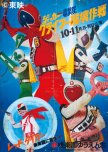
-Big One/Banba is a really likeable character.
-Some cool spy action here and there.
-A few cool monster of the week.
-Really cool aesthetics.
Everything the show did bad:
-The team just comes off as generic most of the time, the initial commander too.
-The lack of proper main villain generals is disappointing due to the main antagonist duo being pretty boring.
-The majority of monsters of the week are pretty forgettable.
-As likeable Banba is, he is not likeable enough to make the show enjoyable and alongside him comes Tamasaburou who I never was able to find funny, but this might be a personal issue.
-The show overexploits the "film-reversal" technique of the original Kamen Rider show, which removes most of the impacts from the fights.
Reasons for the show's strengths:
Due to the show's low rating they brought veteran actor Hiroshi Miyauchi who had played previously played Aoranger Kamen Rider V3 to increase the ratings, and ultimately ended up being the best character of the show.
Reasons for the show's problems:
In order to differentiate as much as possible from the previous work Goranger, they tried to make the show have a much darker tone, however the staff didn't know how to properly do that and ultimately ended up with both the heroes and villains feeling boring and hardly ever entertaining. There was supposed to be a time travel plotline but ended up being scrapped due to feeling too detached from the setting, this resulted in the villains not having any direction. The show then was cancelled due to bad reception and had a whole quarter removed.
Overall:
This show just doesn't have enough going for it. Having one likeable character doesn't really fix all the other issues or suddenly makes the rest of the cast suddenly entertaining. The show's just very bland overall and I can only recommend it if you REALLY like Big One and even then he gets introduced on episode 23. This is the worst Super Sentai out of the ones I've seen so far.
Questa recensione ti è stata utile?
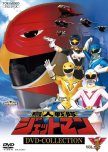
Chojin Sentai Jetman
1 persone hanno trovato utile questa recensione
-Really unique team dynamic where the whole team are jerks, which makes the build up to them becoming a proper team feel great and natural.
-All team members stand out and are constantly entertaining, the commander is also really fun.
-Extremely entertaining and likeable villains.
-Really entertaining and memorable monsters of the week.
-Cool and creative fights both in mecha and outside of mecha.
-Great final arc.
-Cool rivalries with the villains.
-Unique atmosphere mixing romance J-dramas with military kodomo shows and a dash of insanity.
-Some of the most memorable episodes in the entire franchise.
Everything the show did bad:
-The team tends to get their upgrades in really convoluted asspulls (but I found them entertaining so I didn't mind it as much). This makes the writing feel cheap at times.
-The Neo Jetman two-parter sucks for the most part despite the cool concept.
-Blue ranger Ako, yellow ranger Raita and Commander Aya get considerably less screen time than the other 3 members. But they still manage to be extremely likeable so it's not that big of a problem.
-The main antagonists being extremely powerful but not fully using their powers to compete with themselves is not a premise for everybody and can make the writing feel cheap. Personally the villains' charisma made them super likeable throughout and never minded this but felt like pointing it out.
-The ending is controversial and not for everybody, personally I didn't mind it.
-At times it feels like the white ranger Kaori doesn't get reprimanded enough for her actions, but this is mostly a nitpick.
Reasons for the show's strengths:
After having 9 shows in a row done mostly by the same staff Super Sentai was struggling to stay afloat and considerations for the franchise to be canceled were rising. Due to this chief producer Takeyuki Suzuki chose a young staff that didn't have much experience because he wanted this season to be fresh and also a team that understood that this could be the very last Sentai after promising the sponsors that the sales would go up this season. He got Keita Amemiya to direct who at the time had only directed a non-toku movie and few episodes of previous Sentai and Toshiki Inoue to write who was the son of veteran writer Masaru Igami but had only served as an episode writer for Sentai up to this point.
Despite the decision of choosing this staff was deemed controversial at the time, they made the most unique Sentai that had been made up to that point, one that's considered to be one of the best still today and it's also considered to be one of the most influential Tokusatsu of all time.
The production team tried a bunch of experimental tactics and didn't care much for the sponsors' suggestions since they thought this could be the last one and wanted to do unique stuff just in case.
The producer chose to have a female commander and introduced the concept of "Boy" mechas that served as helpers to the team.
The director came up with ideas for cool props to use in the earlier episodes and for more creative ways of doing the mecha battles.
The main writer came up with the idea for the show to adopt tropes from trendy dramas, which the producer supported him due to having previously worked on Toushou Daimos which also had romance tropes. He also wanted episodes where te team didn't transform and while Toei and the sponsors didn't allow them to realize this idea, the director supported Inoue and made it so that not every ranger had to transform every episode with the exclusion of Yellow Owl and for the cool Black Condor broken helmet scene. So this back and forth arguably gave even better results.
Other experiments by the staff was the villains not having a proper leader, the team calling themselves by their real names after transformation and the team not getting along for the first half of the show which lead to really interesting dynamics.
Reasons for the show's problems:
The main writer Toshiki Inoue didn't really for promoting toys so Jetman's upgrades would often either come out of nowhere or be obtained in a really conveluted manner. He also was really interested in the romance subplot of the show so Raita and Ako got slightly shafted. His writing is pretty insane so the story at times feels not that concise.
Overall:
Amazing show that redefined tokusatsu when it released. The writing is not the most concise but the show manages to be extremely entertaining from beginning to end (with the exception of the Neo-Jetman 2-parter). This was the show that got me into the Super Sentai franchise and highly recommend it to tokusatsu fans or people that are searching for a weirder romance drama.
Questa recensione ti è stata utile?
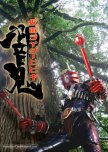
Questa recensione può contenere spoiler
Mild spoilers ahead:
Everything the show did well:-The Teacher-student dynamics in this show are really fun.
-Easily one of the most unique tokusatsu ever made.
-Fantastic action that feels really different from other toku, pretty good CGI for the time too.
-Cases of the week feel really unique and experimental throuout the show.
-Really interesting monster dynamics. For the first half the fights consists in a duo monsters protecting a giant one. In the second half the fights revolve around fending off multiple monsters, at times swarms, simultaneously while they were also defended by the main viain duo.
-Really cool world-building throughout the show.
-All of the characters dynamics in the first half are great.
-The first half has a really comfy atmosphere around it.
-Really experimental way of directing, it might not be for everybody but makes the show stand out and ooze with style.
-Extremely cool fighting style where Riders fight with instruments.
Everything the show did bad:
-The second half introduces the single most hateable character in this franchise to date, Kyosuke Kiriya. He pretty much gives anti-character development to most of the cast and treats them like crap for pretty much no reason. Even though he seemingly gets character development and gets puts in his place a lot, he ultimately backpedals in the end and gets away with being a massive jerk. This just make the show's quality drop hard in the second half.
-The show has the worst final episode in the franchise so far.
-The main villain duo despite starting interesting, the second half ruins them by having a really dumb plot-twist at the end and never explaining their goals. The latter leads to some really cheap writing and plot convinience.
-The titular Rider Hibiki feels a bit more rude in the second half.
-The 3 main apprentices get done really dirty in the second half, specially Akira.
-Tsutomu Tsumura gets written out due to the introduction of Kiriya, so the rivalry that was being set up with him and Asumu goes nowhere.
-The introduction of the Hibiki's final form is really dumb.
-The whole conflict plotline with Ibuki near the end feels really forced.
-The opening shows a bunch of riders who don't actually appear in the show.
-Despite the show having a really unique world by the end, the world-building starts pretty cheap. Most of its detailed are kept vague but then the show decides to info-dump them on episode 11 which feels pretty cheap. After that the world-building is much better for the most part.
-The show doesn't really feel like a Kamen Rider show, which isn't necessarily a bad thing but I feel it should be point out.
Reasons for the show's strengths:
The producer was dead-set at creating something unlike any tokusatsu that preceded it.
Reasons for the show's problems:
This show is the Kamen Rider show with the most problems in its productions so far.
First it wasn't even supposed to be a Kamen Rider show. While Kamen Rider Blade is universally beloved nowadays it had done worse than expected back when it aired. During the Showa era the franchise used to enter hiatuses all the time so Toei originally wanted to take a break from rider after Blade and revive another Ishinomori franchise, in this case, Henshin Ninja Arashi (although this decision was mostly made because the staff wanted to reboot Henshin Ninja Arashi and the fear that Kamen Rider was doing too much Rider VS Rider rather than Blade's ratings). Blade's Jack Form was inspired by said franchise and was seen as at test run to see if this idea would do well. However during pre-production, news about the next Chouseishin season started circulating (a Tokusatsu made by a rival company Toho) that it would have ninjas as a focus so they had to drop rebooting the Henshin Ninja Arashi. Ultimately the show became a new IP, known as Ongeki Rider Hibiki and the show would enter proper production under this title. However the show ultimately rebranded into a Kamen Rider show at the last minute since it was considered that it would produce more money this way and it feared releasing a new IP due to Chouseishin still being a new franchise so they felt they would overlap, that combined with rumors of rival toy company Takara launching a Tokusatsu and GARO coming out (although the latter didnt overlap due to being for an adult demographic). So the show ended up not feeling like Kamen Rider at all initially and starts becoming slightly closer to the franchise from the second quarter onward but it stills feels really different.
The show's producer, Shigenori Takatera went really overbudget with the show since he expected this to be the start of a new franchise. The show's toys sold really poorly so he was adviced to reduce the budget significantly, however he felt this wouldn't allow to achieve the main writer duo's vision so kept going. This ultimately led to him being removed from the show after episode 29 and alongside him left the writer duo, consequently he would be fired after the show ended.
Producer Shirakura was ultimately chosen to continue due to being available at the time as the other producers were occupied with other projects. He would ultimately choose Toshiki Inoue as the main writer due to his experience with weird shows since Hibiki was really experimental, also he was the only main writer out of the ones he had worked on the past to be available at the time.
It's unknown why they didn't use the original script done by the previous staff, but either way Inoue tends to be bad at writing characters that weren't initially conceived by him so he ultimately did a really poor job. Due to the sudden change, there were ton of scheduling issues with the script. Due to rewrites and and issues with meeting deadlines on the finale, the riders that were shown in the opening didn't actually appear in the final battle like they were initially planned.
Overall:
The show's definitely among the most unique tokusatsu out ther, but the second is just such a massive disappointment that I cannot recommended this show. I feel that for most people this show is an overall mediocre 4/10 show, it does enough cool stuff to keep it from being bad but that's it. Personally the cool concepts behind some episodes and the cool fights made me come out overall positive out of the show, but that won't be most people. If you think this show's concepts look really cool, then I recommend watching this show up till episode 29 which feels climatic enough after that it really isn't worth it to keep going unless you're really REALLY curious for what happens next. But it really pains me that the production staff saying this was the "Kamen Rider Amazon of the Heisei era" back at the press conference ended up being a bit TOO accurate and the show ended up changing course halfway through just like Amazon.
Questa recensione ti è stata utile?


